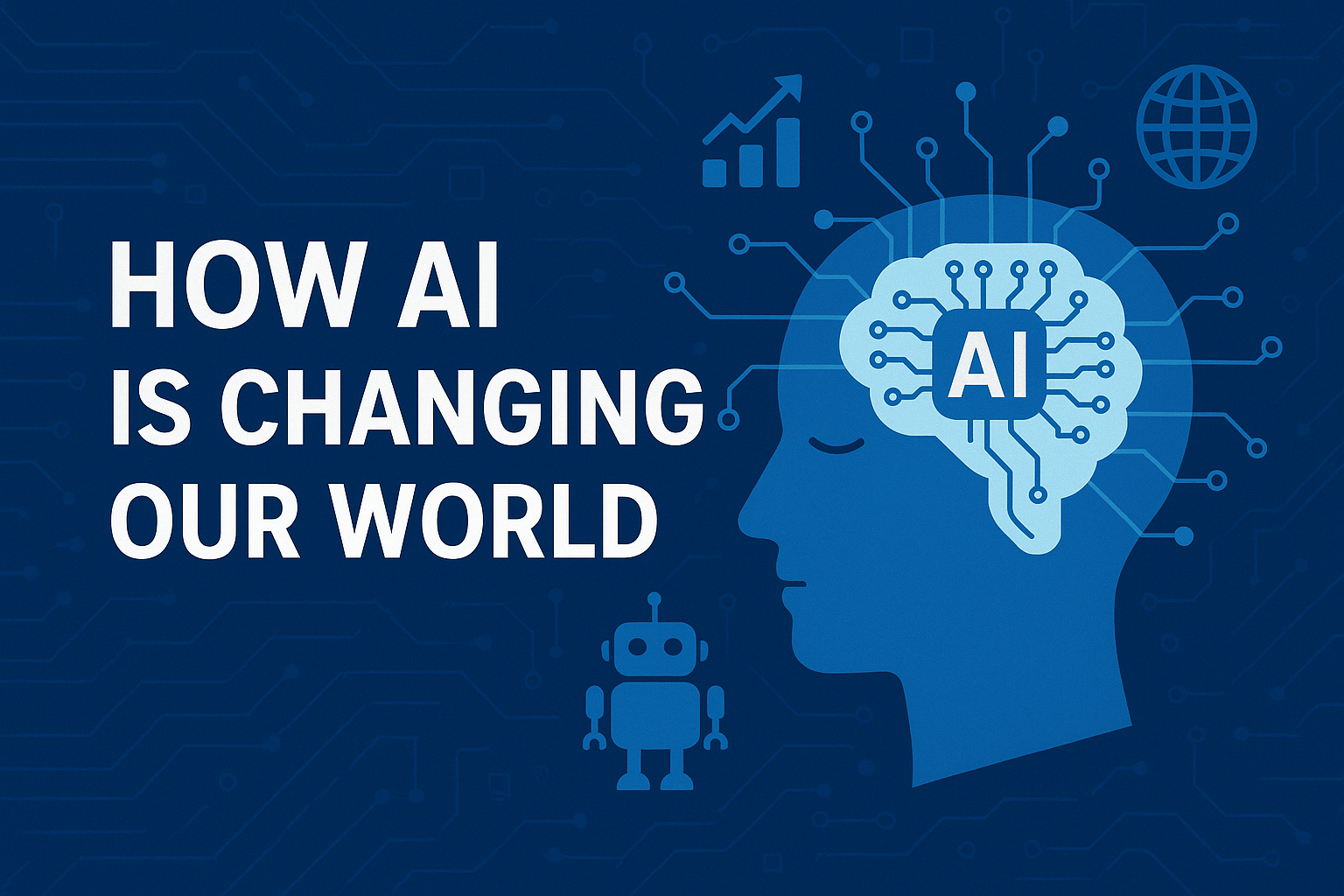Introduction
Artificial intelligence (AI) is no longer a distant concept from science fiction. In 2025, AI is actively shaping many parts of our lives. From helping businesses make faster decisions to supporting doctors in diagnosing diseases, AI is becoming practical, reliable, and essential. It is increasingly affordable and accessible, meaning even small businesses and individuals can benefit.
In this article, we explore ten major areas where AI is changing the world, offering clear examples, case studies, and simple explanations for each. By the end, you'll have a better understanding of how AI affects daily life, business, education, healthcare, and the future of work.
1. AI in Everyday Life
AI is already part of many daily routines, often working behind the scenes. It helps us complete tasks faster, personalize experiences, and stay connected with the world around us.
- Smart Assistants: Devices like Google Assistant, Siri, and Alexa help with reminders, shopping lists, controlling smart devices, and even answering questions.
- Recommendations: Netflix, Spotify, and YouTube use AI to suggest movies, songs, or videos based on your preferences.
- Smart Cameras & Phones: AI improves photos by automatically adjusting lighting, focus, and color, making it easy for anyone to take professional-quality pictures.
Example: Netflix AI examines viewing patterns of over 200 million users to personalize recommendations, increasing user engagement by 30%.
2. AI in Healthcare
Healthcare has seen some of the most impressive AI applications. AI helps doctors detect diseases early, analyze complex data, and improve patient care.
- Medical Imaging: AI algorithms analyze X-rays, CT scans, and MRIs to detect tumors or heart problems that a human might miss.
- Virtual Health Assistants: Chatbots can provide medical advice for minor symptoms, help schedule appointments, and provide reminders for medications.
- Drug Discovery: AI models predict how molecules will behave, speeding up the development of new medications.
Statistics: AI-assisted imaging can improve diagnostic accuracy by 15–20% and reduce the time to detect issues in patients.
3. AI in Business
Businesses use AI to make smarter decisions, improve productivity, and serve customers better.
- Predictive Analytics: AI forecasts sales trends, helping businesses plan inventory and staffing.
- Automation: Tasks like invoice processing, customer emails, and order tracking are handled by AI software.
- Marketing AI: AI personalizes advertisements, predicts customer interests, and measures campaign success.
Case Study: Amazon uses AI to predict product demand and optimize warehouse stock levels, reducing overstock and stockouts by around 25%.
4. AI in Education
AI is personalizing education and helping teachers and students work more effectively.
- Adaptive Learning: Platforms adjust lesson difficulty based on each student’s progress.
- Automated Grading: AI scores multiple-choice and short-answer tests, freeing teachers to focus on mentoring and problem-solving tasks.
- Analytics: Teachers get insights on which topics students struggle with and can provide targeted support.
5. AI in Transportation
AI improves efficiency, safety, and convenience in how people and goods move.
- Navigation: Apps like Waze use AI to avoid traffic and reduce commute times.
- Autonomous Vehicles: Self-driving cars and trucks are being tested, potentially reducing accidents caused by human error.
- Logistics: Companies optimize delivery routes using AI to save fuel and time.
6. AI in Entertainment
- Streaming platforms suggest movies and music personalized to user taste.
- Video games use AI to create smarter, more adaptive opponents.
- AI tools help content creators with editing, music production, and animations, saving hours of manual work.
7. AI in Security
- Banks use AI to detect fraudulent transactions instantly.
- Cybersecurity systems identify unusual network activity to prevent attacks.
- AI assists law enforcement but must be used carefully to avoid privacy violations.
8. Ethical Concerns and Fair Use
- AI can reflect biases in its training data, leading to unfair outcomes.
- Privacy is essential as AI collects and processes personal data.
- Human oversight ensures AI decisions are ethical, especially in high-stakes situations.
9. AI in Creative Fields
- AI tools generate text drafts, images, and music ideas to assist creators.
- Artists and writers refine AI-generated work to add creativity and emotion.
- Copyright and authorship issues are important as AI becomes more capable.
10. The Future of AI and Jobs
- Routine, repetitive tasks are likely to be automated first.
- New job roles focus on AI management, ethics, and integration.
- Workers will need continuous learning, adaptability, and soft skills to stay relevant.
Practical Tips for Individuals
- Learn to use basic AI tools that make daily work easier.
- Create small projects using AI to demonstrate practical knowledge.
- Focus on skills AI cannot replace, like communication, problem-solving, and creativity.
Related Posts
- Top 10 Programming Languages in 2025
- How AI Will Replace and Create Jobs by 2030
- Best Online Courses for High-Paying Jobs in 2025
FAQs
1. How is AI used in daily life?
Voice assistants, recommendation systems, navigation apps, and smart devices are all powered by AI.
2. Will AI take away jobs?
Some tasks will be automated, but new jobs will emerge that require human creativity, judgment, and emotional intelligence.
3. Is AI dangerous?
AI is a tool. Misuse, biased data, and poor oversight can create risks, so responsible use is important.
4. How can I learn AI easily?
Start with online courses, practice small projects, and gradually explore advanced tools as you gain confidence.
5. What are the ethical concerns in AI?
Key concerns include privacy, bias, transparency, and making sure humans remain responsible for important decisions.
6. Can AI improve productivity for small businesses?
Yes. AI automates tasks, predicts customer needs, and helps small businesses operate more efficiently.
7. How does AI help in education?
AI provides personalized learning, automated grading, and insights into student performance for better teaching.
8. What skills should I focus on in the AI era?
Learn AI tools, digital literacy, and soft skills like critical thinking, creativity, and communication.
